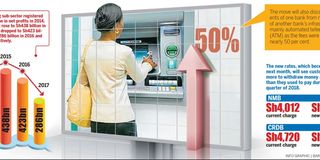Clients to pay more for bank services

What you need to know:
Customers will pay more to access banking services as major commercial banks announce upward adjustments to fees and charges by between 30 and 50 per cent.
Dar es Salaam. Customers will pay more to access banking services as major commercial banks adjust upwards fees and charges by between 30 and 50 per cent.
This comes at a time when the banking sector’s profit level is declining as banks undertake their internal consolidations to contain high levels of Non-Performing Loans (NPLs).
The sector registered a total of Sh426 billion in net profits during the 2014 calendar year. The amount rose to Sh438 billion in 2015 but it dropped to Sh423 billion and Sh286 billion in 2016 and 2017 respectively.
Similarly, most large banks – including NMB Plc, CRDB Plc, Standard Chartered Bank, Exim Bank, TPB Plc - registered declines in profits during the first half of 2018. And, in what looks like an apparent response to the situation, most banks have adjusted their fees and charges upwards by between 30 and 50 per cent on a number of services and products as they seek to garner more cash into the fees and commissions income stream to bolster profits.
A rise in NPLs, mostly because some corporate clients failed to honour their obligations as they align their operations to new economic realities, also saw banks cutting their interest rates to woo an increased number of salaried clients over to their loans.
Since early last year (2018), a number of commercial banks – including NMB Bank Plc, CRDB Bank Plc, BancABC, Ecobank, PBZ and NBC - have announced a reduction in interest rates on personal loans.
In what analysts see as a way of covering that gap while bolstering profits, the Dar es Salaam Stock Exchange (DSE) listed NMB Bank Plc and CRDB Bank Plc as some of the entities that have revised their fees and charges upwards.
The move means that clients will pay more to make use of banking services such as withdrawing cash or making balance enquiries via automated teller machines (ATMs) or bank’s branches, cash transfer and other utility payments.
It will also discourage clients of one bank from making use of another bank’s infrastructure, mainly ATMs, as the fees have been raised by nearly 50 per cent.
The new rates, which become effective next month (February, 2019), will see NMB customers paying Sh6,500 to withdrawal money from the counter, up from Sh4, 012 they used to pay during the third quarter of 2018.
CRDB customers will spend Sh4,720 and Sh6,000 as charges for withdrawing cash, from the counter, on savings and current accounts respectively.
Currently, the charges are Sh3,540 and Sh4,720 for savings and current accounts respectively.
To withdraw cash at an ATM within the same bank, an NMB client will pay Sh1,150. This is more than the Sh944 that they used to pay before the changes.
On the other hand, the charges of withdrawing cash from a CRDB Bank ATM have risen to Sh1,200 within the bank network while those holding cards that are not for CRDB Bank will foot Sh8,000 to withdraw cash from any of the bank’s ATMs.
Prior to that, one would be charged Sh944 to withdraw cash from within CRDB’s ATMs and Sh3,540 if the card used on a CRDB ATM is for the bank’s client.
Similarly, a CRDB Bank client will now be required to pay Sh400 to access the service of balance inquiry via a mobile phone. Before the changes, one would pay Sh354.
NMB Bank has also introduced new charges that include Electronic Funds Transfer (EFT) to other banks with cost of Sh2,000 and mini statements from other banks at Sh1,000.
“Given the big number of their customers that the two banks have across the country, the move may have been aimed at filling the gaps left by a reduction in interest rates on personal loans and NPLs,” a business consultant and managing director for TMS Consulting Ltd, Mr Sebastian Kingu, told The Citizen.
He however noted that the primary source of income by banks remains the interest that a bank gets from the loans it lends to borrowers.



